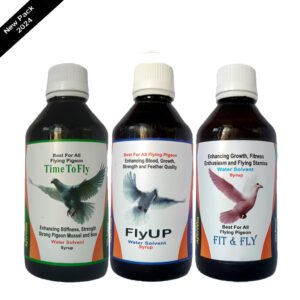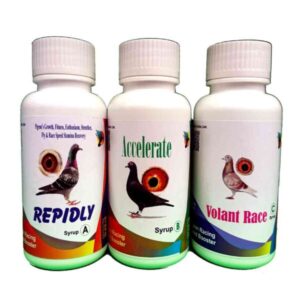Why Choose Ferticit for Egg Laying?
Ferticit is tailored for those aiming to improve egg production quality in female birds. Many pigeon enthusiasts and farmers face challenges with egg laying due to nutrient deficiencies and improper treatments. This product helps address these issues while promoting a healthy breeding process.
Understanding the Problem
It is common for birds to overproduce eggs, leading to stress and complications. This problem often arises when birds do not receive adequate nutrients or fail to undergo appropriate treatment at the right time. Ferticit is designed to counteract these exact issues, ensuring that your birds remain healthy while optimizing their egg-laying potential.
Directions for Use
To achieve the best results with Ferticit, adhere to the recommended dosage:
- For the first 15 days, administer 1 Ferticit Capsule to the female bird with water in the morning and evening.
- After the initial 15 days, maintain a daily dosage of one capsule per day.
- Alongside the capsule, supplement with Ferticit Fairy Syrup, giving 2-3 drops in the morning and evening mixed with water.
This regimen should be followed for a duration of 60 days to maximize the egg breeding process effectively. Ensure the female bird receives this care consistently for optimal results.
Storage and Contact Information
For best results, store Ferticit in a cool, dark, and dry place. Keep it protected from heat and direct sunlight. Always ensure the bottle cap is secured properly after use to maintain the product’s integrity.
If you have any queries or require further assistance regarding Ferticit, feel free to reach out to Dr. Rajvir Grewal via WhatsApp at +91-9463990900. Your birds’ health and egg production success are our top priorities!
Symptoms
A female pigeon experiencing egg-laying problems, such as egg binding (where the egg gets stuck) or the inability to lay eggs, can face serious health issues. These issues can stem from various factors including nutritional deficiencies, hormonal imbalances, reproductive tract infections, or even age-related decline in fertility. Treatment often involves veterinary care, which may include medication, dietary adjustments, or even surgery in severe cases.
Egg Binding:
This occurs when a pigeon’s egg gets stuck in the oviduct, preventing it from being laid. It can be caused by a variety of factors, including a lack of calcium or vitamin D3, obesity, or even the egg being too large.
Inability to Lay Eggs:
Some pigeons may stop laying eggs altogether, which can be due to age, hormonal imbalances, or underlying health issues like tumors or infections.
Sometimes, a pigeon may lay a broken egg, either inside its body or after it’s laid. This can be a serious problem, as the broken pieces can cause infections or blockages.
Possible Symptoms of a Pigeon Not Laying Eggs:
Lack of Nesting Behavior:
A hen that’s not producing eggs might show reduced interest in nest building or may not even be laying eggs despite the presence of a nest.
Physical Signs:
- Swollen abdomen: If an egg is stuck (egg binding), the pigeon may appear to have a large, distended abdomen.
- Clenching and unclenching of the vent: This can be a sign that the pigeon is struggling to lay an egg.
- Fluffed feathers: The pigeon may appear ruffled or fluffed up, possibly due to feeling unwell or cold.
- Weakness or lethargy: The pigeon might appear tired, weak, or unwilling to fly.
- Decreased appetite: A pigeon experiencing reproductive issues may have a reduced appetite.
- Panting: This can indicate stress or difficulty laying eggs.
Specification
Product type: Femail Fertility Treatment
Product Form: 60.Capsule, 2 Type Syrup
Product Life: 3 Year
MPN: DR9090127PDX
Warning: Not for Human Use
Product Storage: Keep place cool, dark and dry place. Protect from heat and direct sunlight. Close bottel cap propperly after use.









There are no reviews yet.